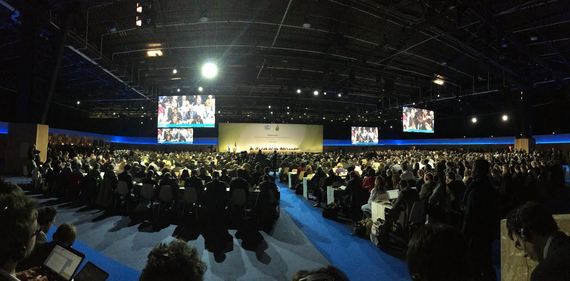Being from Belfast, I know more than a little bit about the Titanic. For most of us, the tragic story of a boat built in our city and sunk in the mid-Atlantic is somewhat tired. Yet it came to my mind as I watched UN climate change negotiations play out in Paris for the last two weeks.
Like the Titanic itself the Climate Change Convention, under which negotiations for a new global agreement have been carried out for the past four years, had a grand billing. It took a lot of hard graft and sweat to create, and was a feat of visionary engineering. Similarly, it carried many hopes and dreams of a better world: a world where super typhoons would not devastate communities; where everyone had access to food and energy; a world where some regions are not seen as sacrifice zones for others; a world where we're all equal and free to live and love life.
Also similarly to the Titanic, the Climate Change Convention knew it would have to navigate among several icebergs in stormy waters. The danger of irreversible climate change floats alongside other very real threats to human civilization such as worsening inequality and stagnant wages for the working classes. However, rather than guide the ship and everyone on it to safety, rich countries - primarily led by the United States - have steered us directly onto a collision course with a mega-iceberg by consistently refusing to do their fair share of climate action.
With this "new agreement," it looks like we will be hitting the iceberg full steam and head on--current targets for governments will guarantee an amount of warming that is, frankly, incompatible with organized human society as we know it.
Worse, those plans don't kick in for another 5 years. In the meantime, governments and multinationals are continuing their pursuit of fossil fuels--in the face of widespread community resistance. Worse still--many of the poor countries' plans are dependent on money and technology owed to them, which the draft agreement roundly ignores by omitting targets and blurring the distinction between who should provide and who should receive.
As a part of civil society in these talks, I feel like a passenger on the bridge of the Titanic frantically screaming "look out, there's a bloody big iceberg ahead," while others simply rearrange the deck chairs in the delusional hope that will be enough to avoid disaster.
The scary thing is that we may have already been driven into the iceberg. In the third class quarters of the ship, the water is already crashing in and passengers are already drowning. Meanwhile above deck, some of the first class passengers are comfortably reclining with their Panglossian attitudes and theories of incremental change. They are the band, playing a happy tune. They are the patrons of the cocktail hour which stops for nothing and no one.
Having steered us onto the iceberg, a power and petroleum-mad United States is now locking the emergency exits for the lower decks by refusing to address the impacts--the permanent losses and irreparable damages--of the climate crisis. They insist on having an escape clause in the new agreement which would clear them of any liability should a small island go under, or another super-typhoon make landfall. The way in which they insist is, to be polite, tantamount to bullying.
Chaos is a challenge to unity. Amid the chaos of this sinking ship, the third class passengers have been reduced to fighting among themselves for the dubious promise of a spot on one of the lifeboats. Of course they will never see the lifeboat: divide and rule is a tried, tested, and often successful strategy of the rich and powerful--in Paris those rich countries have deployed both approaches of carrot (empty promises of bilateral money) and stick (threatening phone calls to capitals).
This analogy, like any analogy, has a limit and I have reached it. The difference between the situation before us and the history of the Titanic is that the Titanic sank. We don't have to follow suit. Another world is possible. It only depends on whether or not enough people realize this and reclaim power in time. It depends on you, the climate justice movements--the last line of defense between the world and a watery death.
This post is part of a "Youth Voices" series produced by The Huffington Post, in conjunction with the U.N.'s 21st Conference of the Parties (COP21) in Paris (Nov. 30-Dec. 11), aka the climate-change conference. The series will put a spotlight on college or high school activists committed to combating climate change, and is part of HuffPost's What's Working editorial initiative. To view the entire series, visit here.
